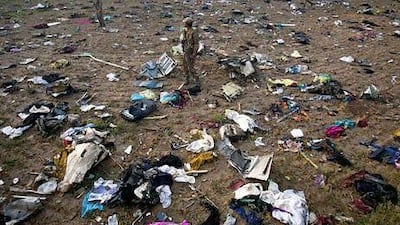ISLAMABAD // The head of the airline whose jet crashed near Islamabad was banned yesterday from leaving Pakistan by the authorities, as they began an investigation into one of the country's worst aviation disasters.
The Bhoja Air flight from Karachi burst into flames as it hit fields in a village on the outskirts of the capital on Friday evening during its final approach to the airport. All 127 people on board, including two infants and six crew members, were killed.
"It is a big tragedy for the country," said the prime minister, Yusuf Raza Gilani, who ordered a judicial probe.
Rehman Malik, Pakistan's interior minister, said the head of Bhoja Air, Farooq Bhoja, was put on the country's "exit control list", which bans him from travelling abroad.
Mr Malik said the plane's flight data recorder had been recovered and would be sent abroad, most likely to South Africa, for investigation.
"Action will be taken, and will be seen to have been taken, I promise you," he added.
Officials in Islamabad's main hospital, the Pakistan Institute of Medical Sciences (Pims), said 118 bodies had been retrieved and DNA tests would be carried out on the badly charred remains of others to establish their identity.
Outside the emergency department of Pims, relatives of victims wailed as they were asked by officials to identify their loved ones.
Among the victims were Tanveer Jan and Sadaf Tanveer, a newlywed couple, who were on their honeymoon to northern Pakistan.
"I never saw my brother so happy [as] when I was saying goodbye to them. I never thought it was my last goodbye to them," said Moiz, Tanveer's younger brother, as he stood beside the wooden caskets, covered with red roses, of his brother and sister-in-law at the hospital.
"I have not yet told this bad news to my mother. She will die. I don't know how to tell her this," he said, with tears in his eyes.
"They are playing with the lives of people. Why did they allow an obsolete plane to fly?," asked Aashi Munir, Ms Jan's aunt.
Just a few metres away, Mohammad Riffatullah stood near the coffins of his daughter, Sobia Obaid, and her two-year-old daughter, Taiba Rehman.
"I did not believe it when I was told this. I don't believe even now," the bearded man said as tears rolled down his cheeks. "When I saw their bodies, it looked as if they were sleeping. There is blood but no wound on their bodies."
As Mr Riffatullah spoke, more bodies wrapped in white sheets were taken from ambulances by rescue workers.
On the walls of the hospital, names and national identity card numbers of unclaimed bodies were displayed.
At the crash site, articles of clothing, wallets, eyeglasses and arm bangles were among the personal effects of the passengers strewn in the fields of Hussainabad.
Parts of the aircraft smashed into electricity poles, blanketing the area in darkness. There were no reports of casualties on the ground.
The tragedy revived memories of a similar crash in Islamabad two years ago, when an Air Blue plane hit the hills overlooking the capital, killing all 152 people on board.
As relatives were searching for their loved ones, retired Colonel Shameen Sheikh pasted a card on a wall of the hospital that read: "We express solidarity with the grieving relatives of victims of air crash."
"I lost my son in the 2010 crash. This tragedy has reopened our own wounds," he told The National.
Bhoja Air is a small airline that started domestic operations in 1993 and expanded to international flights to the UAE in 1998.
The company suspended operations in 2001 because of financial difficulties but resumed them last month. Aviation officials said it was the first flight of the Boeing 737 since service restarted.
The Daily News quoted unnamed aviation officials as saying that "immense political pressure" was exerted on the Civil Aviation Authority to grant a licence to Bhoja Airlines to relaunch its operations and that proper security and safety checks were not carried out on the nearly 30-year-old plane.
But the authority's chairman, Nadeem Khan Yusufzai, denied the allegations and said that the licence was granted on merit.
"The operation of the aircraft was in line with prescribed procedures," he told a news conference yesterday. "The plane was found fully in order."
Mr Yusufzai said the plane was in contact with the airport's control tower when it suddenly dropped from 2,900 feet to 2,000 feet. "Then contact was lost" and the plane disappeared from the radar.
He said an investigation would look at all possibilities, from a technical fault to bad weather.
The state-run Pakistan International Airlines (PIA) has had two disasters in other countries. In 1979 and 1992, PIA jets crashed in Jeddah and Kathmandu, killing 156 and 167 people, respectively.
In 2006, a PIA plane crashed near Multan, Pakistan, killing 45 people.
Although Pakistan's air industry has been booming, critics say airlines do not comply with safety and service standards.
